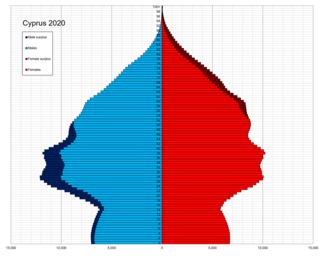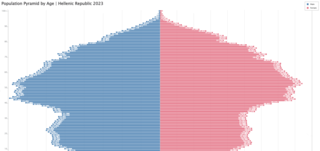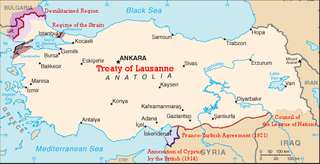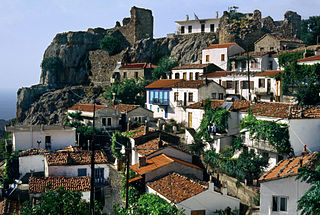
Anatolia, also known as Asia Minor, is a large peninsula or a region in Turkey, constituting most of its contemporary territory. Geographically, the Anatolian region is bounded by the Mediterranean Sea to the south, the Aegean Sea to the west, the Turkish Straits to the north-west, and the Black Sea to the north. The eastern and southeastern boundary is either the southeastern and eastern borders of Turkey, or an imprecise line from the Gulf of Iskenderun to the Black Sea. Topographically, the Sea of Marmara connects the Black Sea with the Aegean Sea through the Bosporus strait and the Dardanelles strait, and separates Anatolia from Thrace in the Balkan peninsula of Southeastern Europe.

Athens is the capital and largest city of Greece. A major coastal urban area in the Mediterranean, Athens is also the capital of the Attica region and is the southernmost capital on the European mainland. With its urban area's population numbering over three million, it is the eighth largest urban area in the European Union. The Municipality of Athens, which constitutes a small administrative unit of the entire urban area, had a population of 643,452 (2021) within its official limits, and a land area of 38.96 km2 (15.04 sq mi).

Cyprus, officially the Republic of Cyprus, is an island country in the eastern Mediterranean Sea, north of the Sinai Peninsula, south of the Anatolian Peninsula, and west of the Levant. It is geographically a part of West Asia, but its cultural ties and geopolitics are overwhelmingly Southeast European. Cyprus is the third-largest and third-most populous island in the Mediterranean. It is east of Greece, north of Egypt, south of Turkey, and west of Lebanon and Syria. Its capital and largest city is Nicosia. The northeast portion of the island is de facto governed by the self-declared Turkish Republic of Northern Cyprus.

The people of Cyprus are broadly divided into two main ethnic communities, Greek Cypriots and Turkish Cypriots, who share many cultural traits but maintain distinct identities based on ethnicity, religion, language, and close ties with Greece and Turkey respectively. Before the dispute started in 1964 the peoples of Cyprus were dispersed over the entire island.

Greece, officially the Hellenic Republic, is a country in Southeast Europe. Located on the southern tip of the Balkan peninsula, Greece shares land borders with Albania to the northwest, North Macedonia and Bulgaria to the north, and Turkey to the east. The Aegean Sea lies to the east of the mainland, the Ionian Sea to the west, and the Sea of Crete and the Mediterranean Sea to the south. Greece has the longest coastline on the Mediterranean Basin, featuring thousands of islands. The country comprises nine traditional geographic regions, and has a population of nearly 10.4 million. Athens is the nation's capital and largest city, followed by Thessaloniki and Patras.

The Demographics of Greece refer to the demography of the population that inhabits the Greek peninsula. The population of Greece was estimated by the United Nations to be 10,445,365 in 2021.

The Treaty of Lausanne is a peace treaty negotiated during the Lausanne Conference of 1922–23 and signed in the Palais de Rumine in Lausanne, Switzerland, on 24 July 1923. The treaty officially resolved the conflict that had initially arisen between the Ottoman Empire and the Allied French Republic, British Empire, Kingdom of Italy, Empire of Japan, Kingdom of Greece, Kingdom of Serbia, and the Kingdom of Romania since the outset of World War I. The original text of the treaty is in English and French. It emerged as a second attempt at peace after the failed and unratified Treaty of Sèvres, which had sought to partition Ottoman territories. The earlier treaty, signed in 1920, was later rejected by the Turkish National Movement which actively opposed its terms. As a result of the Greco-Turkish War, İzmir was reclaimed, and the Armistice of Mudanya was signed in October 1922. This armistice provided for the exchange of Greek-Turkish populations and allowed unrestricted civilian, non-military passage through the Turkish Straits.

The Greeks or Hellenes are an ethnic group and nation native to Greece, Cyprus, southern Albania, Anatolia, parts of Italy and Egypt, and to a lesser extent, other countries surrounding the Eastern Mediterranean and Black Sea. They also form a significant diaspora, with many Greek communities established around the world.

Thessaly is a traditional geographic and modern administrative region of Greece, comprising most of the ancient region of the same name. Before the Greek Dark Ages, Thessaly was known as Aeolia, and appears thus in Homer's Odyssey.

Samothrace is a Greek island in the northern Aegean Sea. It is a municipality within the Evros regional unit of Thrace. The island is 17 km (11 mi) long, 178 km2 (69 sq mi) in size and has a population of 2,596. Its main industries are fishing and tourism. Resources on the island include granite and basalt. Samothrace is one of the most rugged Greek islands, with Mt. Saos and its highest peak Fengari rising to 1,611 m (5,285 ft). The Winged Victory of Samothrace statue, which is now displayed at the Louvre in Paris, originates from the island.

Eastern Macedonia and Thrace is one of the thirteen administrative regions of Greece. It consists of the northeastern parts of the country, comprising the eastern part of the region of Macedonia along with the region of Western Thrace, and the islands of Thasos and Samothrace.

Western Greece Region is one of the thirteen administrative regions of Greece. It comprises the western part of continental Greece and the northwestern part of the Peloponnese peninsula. It occupies an area of 11,336 km2 (4,377 sq mi) and its population is, according to the 2011 census, at 679,796 inhabitants. The capital of the Western Greece is Patras, the third-largest-city in the country with a population of about 280,000 inhabitants. The NUTS 2 code for the region of Western Greece is EL63.

Western Macedonia is one of the thirteen administrative regions of Greece, consisting of the western part of Macedonia. Located in north-western Greece, it is divided into the regional units of Florina, Grevena, Kastoria, and Kozani. With a population of approximately 255,000 people, as of 2021, the region had one of the highest unemployment rates in the European Union.

Kalamata is the second most populous city of the Peloponnese peninsula, after Patras, in southern Greece and the largest city of the homonymous administrative region. As the capital and chief port of the Messenia regional unit, it lies along the Nedon River at the head of the Messenian Gulf.

Alonnisos, also transliterated as Alonissos, is a Greek island in the Aegean Sea. After Skiathos and Skopelos it is the third member of the Northern Sporades. It is 3 km (2 mi) (2 nm) east of the island of Skopelos. Alonnisos is also the name of a village on the island, as well as the municipality that encompasses the island and the village.

The Greek diaspora, also known as Omogenia, are the communities of Greeks living outside of Greece and Cyprus.

Epirus is a traditional geographic and modern administrative region in northwestern Greece. It borders the regions of Western Macedonia and Thessaly to the east, West Greece to the south, the Ionian Sea and Ionian Islands to the west and Albania to the north. The region has an area of about 9,200 km2 (3,600 sq mi). It is part of the wider historical region of Epirus, which overlaps modern Albania and Greece but lies mostly within Greek territory.

The Peloponnese Region is a region in southern Greece. It borders Western Greece to the north and Attica to the north-east. The region has an area of about 15,490 square kilometres. It covers most of the Peloponnese peninsula, except for the northwestern subregions of Achaea and Elis which belong to Western Greece and a small portion of the Argolid peninsula that is part of Attica.

Central Greece is one of the thirteen administrative regions of Greece. The region occupies the eastern part of the traditional region of Central Greece, including the island of Euboea. To the south it borders the regions of Attica and the Peloponnese, to the west the region of West Greece and to the north the regions of Thessaly and Epirus. Its capital city is Lamia.



















